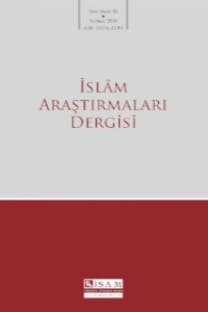İbn Rüşd Öncesinde Hanefîlerin Umûmü’l-Belvâ Telakkisini Benimseyen Bir Mâlikî: İbn Huveyz Mendâd
Hanefî mezhebinin haber anlayışında umûmü’l-belvâ kapsamında değerlendirilen meselelere özel bir önem atfedildiği görülmektedir. Hanefî âlimleri, umûmü’l-belvâ olduğuna hükmettikleri meselelerde rivayetin meşhur derecesine ulaşmış olmasını, onun sıhhati için gerekli bir kriter olarak vazetmişlerdir. İsnat açısından gerekli sıhhat şartlarını taşımakla birlikte umûmü’l-belvâ bir konuda ahad kalan haberleri, zâhirî değil de bâtınî bir inkıta ile illetli saymışlardır. İnsanların genelini ilgilendiren, bu açıdan yalnızca ulemanın değil, avamın da hükmünü bilmesi gerektiği düşünülen meselelerde rivayetlerin ahad haber seviyesinde kalamayacağını savunan Hanefî âlimleri, öncelikle umûmü’l-belvâ olarak niteledikleri konuların ortak hususiyetlerini belirleyerek bu anlayışı aklî ve naklî delillerle temellendirmişlerdir.
Anahtar Kelimeler:
umûmü'l-belvâ, amelü Ehl-i Medine, Irak, Malikî mezhebi
A Mâlikî who Adopted the Umûm al-Balwâ Evaluation of the Hanefites before Ibn Rushd
This study examines the comparison between the “amalu ahl al-Medîna” (the practice of Medinan Companions) and umûm al-balwâ (general practice) made by, a fiqh scholar of the Iraqi Mâlîkî school, Ibn Huwayz Mandad who lived in the 4th century AH. Ibn Huwayz, who apparently adopted the Hanafî evaluation of umûm al-balwâ, also claimed that Imam Mâlik held this view. This shows that there was an attempt to establish a connection between the philosophical background of these two concepts before Ibn Rushd (d. 595/1198), who tried to compare the two. It can be said that this first attempt is important in that it made a contribution to the sect’s concept of reporting in the fourth century, an important era in the development of the discipline of fiqh methodology.
Keywords:
news umûm al-balwâ, amalu ahl al-Medîna, Iraq, Maliki school,
___
- Ebû Bekir Ahmed b. Ali er-Râzî el-Cessâs, el-Fusûl fi’l-usûl (nşr. Uceyl Câsim en-Neşemî), İstanbul: Mektebetü’l-İrşâd, 1994.
- ISSN: 1301-3289
- Yayın Aralığı: Yılda 2 Sayı
- Başlangıç: 1997
- Yayıncı: TDV İslâm Araştırmaları Merkezi
